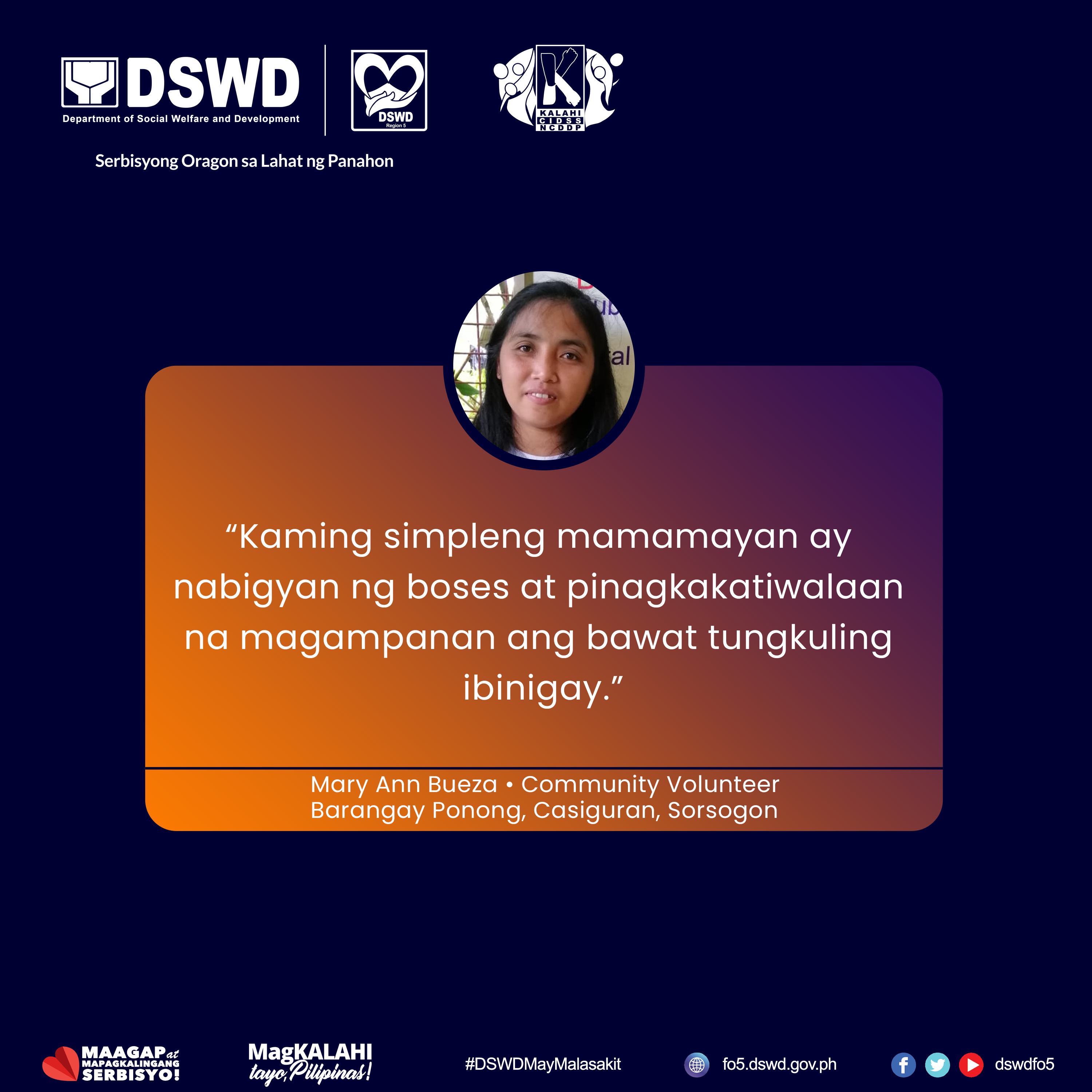
The Coronavirus Disease (COVID-19) pandemic has brought fears to everyone. It also affected so many communities in different aspects especially livelihood and employment. One of these communities is Barangay Ponong in Casiguran, Sorsogon.
Based on the damage assessment conducted by the barangay, 206 out of 263 households with low income and no permanent employment were severely affected by the pandemic. Included in the affected families are skilled workers, farmers, and fisherfolks.
Fisherfolks cannot have their broken fishing paraphernalia repaired because of their low income as they need to prioritize the needs of their families first.
Meanwhile, community members do not have the necessary tools to set up a vegetable garden that will serve as the main source of food and livelihood.
Since most of the families have low income, they also suffered from the lack of food and proper nutrition for children.
FUNDING THE PROJECT
In order to address these problems, the community proposed the provision of fishing paraphernalia and gardening tools to be funded by the Department of Social Welfare and Development Kapit-Bisig Laban sa Kahirapan – Comprehensive and Integrated Delivery of Social Services (DSWD Kalahi-CIDSS) under the Disaster Response Operations Procedure (DROP).
The tools proposed by Barangay Ponong will be used to assist in the livelihood of fisherfolks and communal gardening of the residents to ensure the income and food security of the community.
According to Mary Ann Bueza, a community volunteer, they were able to secure the funding of their proposed projects with the help of the community members and strong support from the barangay and municipal local government units (LGUs).
The program has allocated Barangay Ponong with Php337,857.44 wherein Php237,857.44 for fishing paraphernalia of 47 fisherfolks and Php100,000.00 for the gardening tools of the residents.
AS A VOLUNTEER OF THE PROGRAM
For Mary Ann, being a community volunteer assigned as a Barangay Sub-Project Management Committee (BSPMC) chairperson is a new and overwhelming experience that she questioned her abilities if she can lead the project implementation.
“Sa una, madami ang naging katanungan sa aking isip katulad na lamang ng, kaya ko bang maging lider?”, Mary Ann said.
(At first, I have so many questions regarding my ability as a leader)
Despite her arising questions, Mary Ann was determined to learn the program process.
“Palagi akong dumadalo sa mga patawag na gawain, pagdalo sa mga pagsasanay at aktibong nakikilahok na kung saan sa pamamagitan nito ay tumataas ang aking kumpyansa na makaya ang obligasyong ibinibigay at ipinagkatiwala sa akin,” the volunteer explained.
(Attending meetings, trainings, and active participation during the implementation contributed in boosting my confidence in performing the expected obligations.)
As a volunteer, Mary Ann also encountered problems in dealing with people. She would often receive questions, grievances, and negative reactions from some community members.
“Nakakapanghina at para na akong sumuko sa sakit ng ulo pero ganoon yata talaga, iniisip ko na lang na isa itong pagsubok na dapat kong malampasan,” Mary Ann revealed.
(Receiving negative comments is grueling to the point that I wanted to give up but I tried my best to think that this is just a challenge I needed to overcome.)
Despite the challenges, the community was able to complete the projects on November 30, 2020.
The volunteer also shared that they are happy to be given a chance to decide on their projects.
“Kaming simpleng mamamayan ay nabigyan ng boses at pinagkakatiwalaan na magampanan ang bawat tungkuling ibinigay,” Mary Ann imparted.
(Ordinary citizens like us were given a voice and trust to perform the duties given.)
Mary Ann also mentioned that being community volunteer is not a joke.
“Worth it naman kung ang mamumutawi sa mga labi ng beneficiaries sa komunidad ay isang simpleng salitang, ‘salamat sa inyo mga volunteers’ iyan kasi ang gantimpala para sa aming volunteers,” she continued.
(Being a volunteer is indeed worth it if we hear the beneficiaries saying ‘thank you volunteers’ because it serves as a reward for us) /ramsertan
With report from Katherine Martillana
ABOUT DSWD KALAHI-CIDSS
DSWD Kalahi-CIDSS is a poverty alleviation program that helps communities in poor municipalities to identify challenges on poverty and implement developmental projects using the Community-Driven Development (CDD) approach.
To hasten approval of community projects and its implementation during pandemic, the program used DROP, a simplified Community Empowerment Activity Cycle (CEAC) which still follows the principles of CDD.
In Sorsogon, DSWD Kalahi-CIDSS implemented DROP in four (4) municipalities with a total grant implementation of Php45,658,050.00.
For more details about DSWD Kalahi-CIDSS, follow this link:
